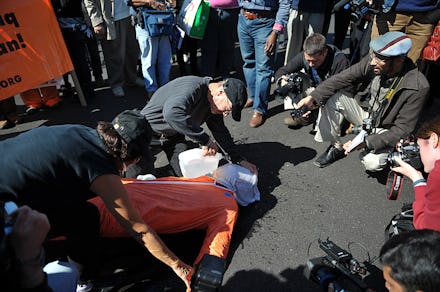What is waterboarding? Here's what military torture could look like under Trump.

President Donald Trump is advocating for the United States to bring back the use of waterboarding and secret black site prisons — two grim hallmarks of the George W. Bush administration's so-called "enhanced interrogation" program that was instituted in the aftermath of 9/11. Former President Barack Obama eliminated the program in 2009.
Though the Senate Select Committee on Intelligence found in 2014 that torture was an ineffective method of gathering information — a conclusion supported by psychologists — Trump said in an interview with ABC News on Wednesday that he "absolutely" feels waterboarding works and would consider it as a method of fighting terrorism.
"As far as I'm concerned, we have to fight fire with fire," he said.
However, experts warn of the "potentially existential" costs of reinstating the torture tactics.
Steven Kleinman, a retired Air Force colonel and interrogations expert, told the Guardian that torture "immediately undermines a source’s ability to be a reliable reporter of information" and comes at a "substantial" cost.
"We can’t take the morality out of strategy," Kleinman said.
Sen. John McCain, who was tortured as a prisoner of war in Vietnam, has said waterboarding is prohibited by the Geneva Conventions against torture and that he would fight an attempt to bring back "enhanced interrogations."
“The president can sign whatever executive orders he likes," McCain said in a statement. "But the law is the law. We are not bringing back torture in the United States of America."
What is waterboarding?
During the act of waterboarding, interrogators cover a subject's face with a cloth and pour water over the person's nose to simulate drowning. The practice has been used around the world since at least the Spanish Inquisition — and in the United States for decades — but it achieved a new level of notoriety in the years after 9/11, when the Bush administration used it on people it suspected of terrorism during its war on terror.
The CIA claimed so-called "enhanced interrogation" had produced information that "helped the United States thwart attack plans, capture terrorists and save lives."
But an exhaustive 2014 Senate report found that the tactics used by the agency were inhumane and ineffective and that waterboarding is widely considered to be torture. As McCain pointed out in an interview with Joe Scarborough on Wednesday, waterboarding was one of the war crimes committed against American prisoners of war for which the United States convicted and executed Japanese soldiers.
In 2008, the late writer Christopher Hitchens famously submitted to waterboarding for a Vanity Fair article, in which he wrote "If waterboarding does not constitute torture, then there is no such thing as torture."
Trump has long been a proponent of the interrogation technique. During a campaign event in 2015, he told a crowd, "You bet your ass I would" approve of waterboarding. In November, Vice President Mike Pence said, "We're going to have a president again who will never say what we'll never do."